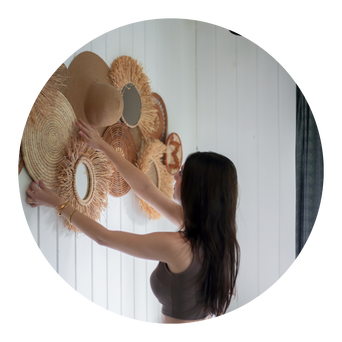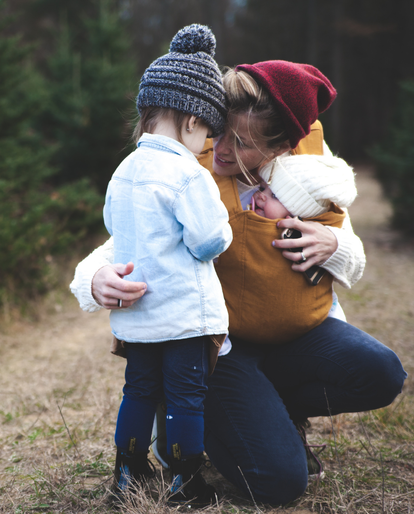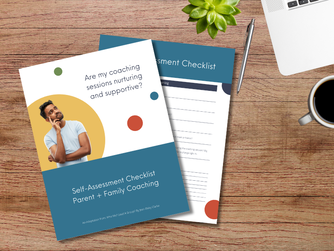 This morning I was arranging my pillows on my bed and as I stepped back, content with the arrangement. I smiled, and I thought. I wonder if coaching is a little like being an interior designer. You might be scratching your head wondering how I could make the leap. Bear with me for a moment. When it comes to decorating, I know what I like. I am drawn to certain colors and certain styles. I can go shopping and come home with a whole trove of treasures, but then it sits in a pile because I cannot figure out how to pull it together. I rely on my daughter, my go-to interior designer, to come over and help me make it work. That’s what happened with the bed pillows. Still scratching your head, wondering, “How did Lisa get parent coaching out of that?” Readiness I was unhappy with the way my pillows were arranged. The room was feeling frumpy. I was ready for a change. People look to coaches because something is not working in their lives, and they are ready to make a change.  Finding clarity I had an idea of where I wanted to go with color and style, but I was overwhelmed and could not get it to work. My daughter asked me questions to help me become clearer about what I wanted. Our clients often know where they want to be, it is getting there that is the struggle. As coaches, we use questions to help individuals gain clarity. Identifying Strengths My daughter walked through the house and collected blankets and pillows from spaces I already loved. Then we experimented to find the right arrangement and color palette. Coaches help individuals identify times they have worked through a similar challenge or situation to identify strengths. Then they explore ways to use those strengths with the current problem. Space for Experimenting I thought I needed new pillows and pillowcases to create the look and feel I wanted. With the help of my daughter, I realized what I had was enough. I just wasn’t arranging them correctly. Clients come to us feeling overwhelmed because they think they need to make big changes. Most of the time they just need a space where they can be curious and experiment as they learn to use old skills in new ways.  Empowering Having the pillows arranged in a way that makes me smile has inspired and empowered me to decorate the rest of the room...finally. Whatever was blocking me for the last 5 years is gone. When clients accomplish small goals, it inspires and empowers them to continue to learn and grow. Connection It is more fun to decorate with someone else. When I call a daughter over to help it is as much about the connection as it is about needing the help. Research suggests that people do their best thinking when they are doing it in relationship with someone else. As a coach, our most important skill is building a trusting connection. My daughter is not trained designer. She is just someone who loves and cares about me. My invitation to you is to identify the “interior decorators” in your life. Who are the people that help you find clarity, realize your strengths, let you experiment? Who are the people that empower you. Still, looking for an interior designer? Contact us for coaching or join a Connection Group. We love watching you grow! FREEBIE ALERT!
Are we thinking for parents when they are capable of thinking for themselves?When a parent comes to you frustrated by their teenager’s (or threenager’s) behavior, where do your thoughts go?
Do you stay with them in their state of frustration or do you immediately go into your own head about how the child’s behavior is developmentally appropriate? Do you even feel a little surge of excitement because you have the perfect strategy that will not only stop the behavior but will help the child develop valuable social-emotional skills? That enthusiasm can feel almost unbearable to hold inside and what spills out is a robust explanation of what’s going on and a solution (or 10) to their problem. Jack and Diane have come to you about their 3-year-old son, Jonny. Jonny is loving and playful and very strong-willed. Getting him to do anything takes lots of creativity and planning. For example, Jack has learned that playing motorcycle in the bathroom helps move teeth brushing along, and Diane has learned to avoid struggles with snacks and things they don’t want Jonny to have by just keeping them out of sight.
It can be exhausting, and Jack is struggling because kids are supposed to “obey.” Jonny should just do what he’s told without all the parenting acrobatics. Jack thinks they are overindulging. As parenting experts, there are many ways we can teach about this. Let’s explore how we can use the Affirmations and the Developmental Jobs of the Child to create a safe space for Jack and Diane to expand perspectives, and empathy. During your session with Jack and Dianne…
Through this exercise, Jack and Diane will have learned that Jonny is doing an excellent job at testing reality and pushing against boundaries. With a bit of help from the coach, they see that both as a strength and challenge. Jack and Diane decide that “I’m glad you are starting to think for your yourself, and You can say no and push and test limits as much as you need to.” Was a great reminder as parents that Jonny is just learning how the world works. They also remembered that part of the process is for the child to test and it’s the parents’ job to set and hold the boundaries. This changed Jack’s heart about Johnny’s behavior. He now understands that Jonny isn’t being difficult. He is just seeing how things work. Diane’s heart became full of strength because she was reminded that Jonny needs the boundaries and rules to push against to grow. Did you notice that as a coach, you didn’t really have to teach? You just provided the prompts and the space that allowed for perspective-taking and empathy. Jack and Diane were really the ones that created a plan once you helped them gather perspectives. Curious about the Developmental Affirmations? Click here to learn more!! Jean Illsley Clarke - WE Newsletter Issue 41, Volume 7  Self- esteem is the gift of love most of us would like to be able to give our children - the children we parent or teach or care about. We want our children to have self-confidence and to know that they are lovable. Some days we aren't sure how to do that. Some days our own self-esteem is low and we wonder how to give what we do not have. Like yesterday, when I did something I hated when my parents did it and I vowed that I would never do it. But I did, because the old ways is "bred-in-the-bone" and I fall back on it when I am unsure of myself or when I have lost sight of other options. So what are my options? How can I build my internal resources?
Or you say "If I haven't been giving it I will feel guilty or hopeless." Don't fret! Forgive yourself and start today. Human beings have an amazing ability to fill in what they did not get earlier. Or you say, "My children know that I love them," or "I tell them every week; isn't that enough?" Partly. We need to say it in lots of different ways. And children learn more from what we do than from what we say. "OK, Ok," you say. "I'm willing to say it and do it in new ways, but how?"  I love you. Period. First of all, practice saying "I love you" without any double standards (When, if, until, as long as, except when, etc.) Just plain "I love you." Period. My mother used to say, "I love you when you are good." Then she didn't tell me how to be good! "I love you," period is the way we help our children get past some of the "I love you when..." double standards that we experienced. Love is unconditional. Love is. All of the wens and ifs link love to approval and have caused some of us adults to doubt that straight unconditional love even exists. But it does, and as we feel it for our children, we can start to reclaim some of it for ourselves. We can practice in the shower saying "I love myself, I love myself, I love myself," until it feels comfortable. We can let all of the old "I love you when you take care of me, " and "I love you if you keep the family secrets," messages run down the drain and leave us with the pure, clean love that we want to offer our kids. But don't we ever say anything more than I love you? Yes, indeed. There are specific love messages or affirmations that we offer to let children know that we love them unconditionally and that we are glad they are doing the developmental tasks that they need to be doing for their age and stage. The "Love Affirmations" are:
They say "I love you and its okay with me that you are doing your developmental tasks." For more information about developmental affirmations: CLICK HERE  Moms, what is your inner coach telling you? When I was young, there was a jingle for a perfume commercial that went like this, “I bring home the bacon, fry it up in a pan, and never let you forget you’re a man because I am a woman.” It still plays in my mind. How is that for programing a mother’s inner coach? Subconsciously it programed how I defined being a good mother and wife. When I was balancing it all, I would literally sing the song to myself to celebrate the power of being a wife and mother. However, that way of being is not sustainable or helpful. It made me feel less than when I couldn’t be all things. Everyone else’s needs came before mine. This often left me with little time for myself. It wasn’t until I was helping my 10-year-old son learn that it was OK to know what he needed and he could ask for help that things started to change. I would practice different ways of showing and saying to my son, “You can know what you need and ask for help. Your needs are important.” I made it a daily habit. What I realized from offering those messages day after day is that my son was not the only one that needed them. The Developmental Affirmations started to replace the “I can do it all” jingle as my inner coach. Instead of bringing home the bacon and frying it up in a pan, I began to hear, “You can be powerful and ask for help at the same time. You can think before you say yes or no and learn from your mistakes and that I am a loveable mother just the way I am.” This month is dedicated to mothers as we explore our inner coaches and while our needs met. Which Developmental Affirmation would help you find the balance between your needs, your family’s needs, and community needs?  This morning I felt no joy as my husband and I were sitting in front of the fireplace watching the snow on April 15. We are ready for warmer weather, our family is not able to be together because of Covid, we just read that we should take down our bird feeders which bring us so much joy because of Avian flu, and we are coming up on the first anniversary of our son’s death. It was easy to slide down the slippery slope of stinking thinking. A couple of hours later, photo memories from April 2019 popped up on my phone. On April 14 we had a snowstorm that dumped 22 inches of snow on us. We had just moved into our new home a couple of weeks prior, and this was the first snow in our new house. It was so exciting! Right down to our first experience living in a townhome where they shovel everything for you, including the front steps! My son was living with us, and my daughter and her husband decided to spend the storm with us—our first sleepover in the new house. We cozied up around the fireplace I had dreamed about having for so long. It was fun to wake up and cook breakfast on that snowy morning with nowhere to go and family around us. Today I was reminded about the power of perspective. The snow was pretty. We need the moisture. The birds have plenty of food in the wild, and I can help them by taking my feeders down. I have some good memories of my son in this house. Finding joy or being resilient doesn’t mean we don’t feel sad or angry or avoid bad thoughts. It isn’t something that just happens when things are good. It is something we choose to practice. To find joy today, I pulled these Affirmations:
If you struggle to find what is good, that’s okay. You can get help by finding a therapist, a friend, a coach, or other inspiration that works for you. Parent Coach Lisa Krause talks Overindulgence
This morning Lisa Krause, Parent Coach and Family Life Educator, sat down with New Day Northwest to discuss the topic of Overindulgence ahead of her presentation the parenting event put on by non-profit PNW Parent Education.
Krause shares some tips on how to spot overindulgence and the impact it can have on children into adulthood. Click here to read the full article. Has it been challenging for you to find resources specific to parent coaching? Whether you are professional coach or a parent looking for a coach, ParentCoachConnection.com was started to inspire innovative and creative strategies designed to support and empower families. We know the information hasn’t changed much since the inception, but stay tuned! Currently, blogs and articles covering a wide range of topics are being worked on and will be added in the near future. It is our goal to provide evidence-based information and create connection in the field of parent coaching.
Are you having a coaching dilemma? Please comment below and let's start discussing! |
Authors
This is a collaborative blog brought to you by the Parent Coach Connection Team and special guests. |







 RSS Feed
RSS Feed
